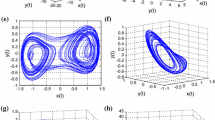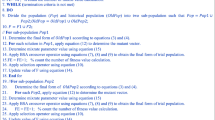Abstract
Parameter identification is an important issue in nonlinear science and has received increasing interest in the recent years. In this paper, an oppositional backtracking search optimization algorithm is proposed to solve the parameter identification of hyperchaotic system. The backtracking search optimization algorithm provides a new alternative for population-based heuristic search. To increase the diversity of initial population and to accelerate the convergence speed, the opposition-based learning method is employed in the backtracking search optimization algorithm for population initialization as well as for generation jumping. Numerical simulations on several typical hyperchaotic systems are conducted to demonstrate the effectiveness and robustness of the proposed scheme.









Similar content being viewed by others
References
Mahmoud, G.M., Mahmoud, E.E., Ahmed, M.E.: On the hyperchaotic complex Lü system. Nonlinear Dyn. 58(4), 725–738 (2009)
Swathy, P.S., Thamilmaran, K.: Hyperchaos in SC-CNN based modified canonical Chua’s circuit. Nonlinear Dyn. 78(4), 2639–2650 (2014)
Mahmoud, G.M., Mahmoud, E.E., Arafa, A.A.: On projective synchronization of hyperchaotic complex nonlinear systems based on passive theory for secure communications. Phys. Scr. 87(5), 10 (2013)
Betancourt-Mar, J.A., Mendez-Guerrero, V.A., Hernandez-Rodriguez, C., Nieto-Villar, J.M.: Theoretical models for chronotherapy: periodic perturbations in hyperchaos. Math. Biosci. Eng. 7(3), 553–560 (2010). doi:10.3934/mbe.2010.7.553
Matouk, A.E., Elsadany, A.A.: Achieving synchronization between the fractional-order hyperchaotic Novel and Chen systems via a new nonlinear control technique. Appl. Math. Lett. 29, 30–35 (2014)
Effati, S., Nik, H.S., Jajarmi, A.: Hyperchaos control of the hyperchaotic Chen system by optimal control design. Nonlinear Dyn. 73(1–2), 499–508 (2013)
Xi, H., Yu, S., Zhang, R., Xu, L.: Adaptive impulsive synchronization for a class of fractional-order chaotic and hyperchaotic systems. Optik Int. J. Light Electron Opt. 125(9), 2036–2040 (2014)
Gambino, G., Sciacca, V.: Intermittent and passivity based control strategies for a hyperchaotic system. Appl. Math. Comput. 221, 367–382 (2013)
Jawaada, W., Noorani, M.S.M., Mossa Al-sawalha, M.: Robust active sliding mode anti-synchronization of hyperchaotic systems with uncertainties and external disturbances. Nonlinear Anal. Real World Appl. 13(5), 2403–2413 (2012)
Lan, Y., Li, Q.: Chaos synchronization of a new hyperchaotic system. Appl. Math. Comput. 217(5), 2125–2132 (2010)
Hegazi, A.S., Matouk, A.E.: Dynamical behaviors and synchronization in the fractional order hyperchaotic Chen system. Appl. Math. Lett. 24(11), 1938–1944 (2011)
Chen, D.-Y., Shi, L., Chen, H.-T., Ma, X.-Y.: Analysis and control of a hyperchaotic system with only one nonlinear term. Nonlinear Dyn. 67(3), 1745–1752 (2012)
Ma, C., Wang, X.: Impulsive control and synchronization of a new unified hyperchaotic system with varying control gains and impulsive intervals. Nonlinear Dyn. 70(1), 551–558 (2012)
Mahmoud, E.E.: Dynamics and synchronization of new hyperchaotic complex Lorenz system. Math. Comput. Model. 55(7–8), 1951–1962 (2012)
Mahmoud, E.E.: Complex complete synchronization of two nonidentical hyperchaotic complex nonlinear systems. Math. Methods Appl. Sci. 37(3), 321–328 (2014)
Mahmoud, G.M., Mahmoud, E.E.: Phase and antiphase synchronization of two identical hyperchaotic complex nonlinear systems. Nonlinear Dyn. 61(1–2), 141–152 (2010)
Mahmoud, G.M., Mahmoud, E.E.: Lag synchronization of hyperchaotic complex nonlinear systems. Nonlinear Dyn. 67(2), 1613–1622 (2012)
Konnur, R.: Synchronization-based approach for estimating all model parameters of chaotic systems. Phys. Rev. E 67(2), 4 (2003)
Li, N., Pan, W., Yan, L., Luo, B., Xu, M., Jiang, N., Tang, Y.: On joint identification of the feedback parameters for hyperchaotic systems: an optimization-based approach. Chaos Solitons Fractals 44(4–5), 198–207 (2011)
Austin, F., Sun, W., Lu, X.: Estimation of unknown parameters and adaptive synchronization of hyperchaotic systems. Commun. Nonlinear Sci. Numer. Simul. 14(12), 4264–4272 (2009)
Feng, J., Chen, S., Wang, C.: Adaptive synchronization of uncertain hyperchaotic systems based on parameter identification. Chaos Solitons Fractals 26(4), 1163–1169 (2005)
Hu, M., Xu, Z., Zhang, R., Hu, A.: Parameters identification and adaptive full state hybrid projective synchronization of chaotic (hyper-chaotic) systems. Phys. Lett. A 361(3), 231–237 (2007)
Mahmoud, G.M., Mahmoud, E.E.: Complete synchronization of chaotic complex nonlinear systems with uncertain parameters. Nonlinear Dyn. 62(4), 875–882 (2010)
Mahmoud, G.M., Mahmoud, E.E., Arafa, A.A.: Controlling hyperchaotic complex systems with unknown parameters based on adaptive passive method. Chin. Phys. B 22(6), 9 (2013)
He, Q., Wang, L., Liu, B.: Parameter estimation for chaotic systems by particle swarm optimization. Chaos Solitons Fractals 34(2), 654–661 (2007)
Peng, B., Liu, B., Zhang, F.-Y., Wang, L.: Differential evolution algorithm-based parameter estimation for chaotic systems. Chaos Solitons Fractals 39(5), 2110–2118 (2009)
Sheng, Z., Wang, J., Zhou, S., Zhou, B.: Parameter estimation for chaotic systems using a hybrid adaptive cuckoo search with simulated annealing algorithm. Chaos 24(1), 013133 (2014)
Lin, J., Xu, L.: Parameter estimation for chaotic systems based on hybrid biogeography-based optimization. Acta Phys. Sin. 62(3), 030505 (2013)
Wang, L., Xu, Y.: An effective hybrid biogeography-based optimization algorithm for parameter estimation of chaotic systems. Expert Syst. Appl. 38(12), 15103–15109 (2012)
Civicioglu, P.: Backtracking search optimization algorithm for numerical optimization problems. Appl. Math. Comput. 219(15), 8121–8144 (2013)
Rahnamayan, S., Tizhoosh, H.R., Salama, M.M.A.: Opposition-based differential evolution. IEEE Trans. Evolut. Comput. 12(1), 64–79 (2008)
Tizhoosh, H.R.: Opposition-based learning: A new scheme for machine intelligence. In: International Conference on Computational Intelligence for Modelling Control and Automation, Vienna, Austria, November 28–30 2005, pp. 695–701. IEEE.
Wang, H., Wu, Z., Rahnamayan, S., Liu, Y., Ventresca, M.: Enhancing particle swarm optimization using generalized opposition-based learning. Inf. Sci. 181(20), 4699–4714 (2011)
Wang, J., Wu, Z., Wang, H.: Hybrid differential evolution algorithm with chaos and generalized opposition-based learning. Adv. Comput. Intell. 6382, 103–111 (2010)
Lin, J., Chen, C.: Parameter estimation of chaotic systems by an oppositional seeker optimization algorithm. Nonlinear Dyn. 76(1), 509–517 (2014)
Bratton, D., Kennedy, J.: Defining a standard for particle swarm optimization. In: Proceedings of the 2007 IEEE Swarm Intelligence Symposium, Honolulu, Hawaii, April 2007, pp. 120–127. Proceedings of the 2007 IEEE Swarm Intelligence Symposium.
Particle Swarm Central: (2013). http://www.particleswarm.info/. Accessed June 2013
Haeri, M., Dehghani, M.: Impulsive synchronization of Chen’s hyperchaotic system. Phys. Lett. A 356(3), 226–230 (2006)
Rössler, O.E.: An equation for hyperchaos. Phys. Lett. A 71(2–3), 155–157 (1979)
Li, Y., Liu, X., Chen, G., Liao, X.: A new hyperchaotic Lorenz-type system: generation, analysis, and implementation. Int. J. Circuit Theory Appl. 39(8), 865–879 (2011)
Acknowledgments
This work is part of a project supported by Scientific Research Fund of Zhejiang Provincial Education Department under Grant No. Y201432261, the National Natural Science Foundation of China under Grant No. 51475410, and the National Natural Science Foundation of China under Grant No. 61403338. The author also would like to thank the anonymous reviewers for their valuable comments and suggestions.
Author information
Authors and Affiliations
Corresponding author
Rights and permissions
About this article
Cite this article
Lin, J. Oppositional backtracking search optimization algorithm for parameter identification of hyperchaotic systems. Nonlinear Dyn 80, 209–219 (2015). https://doi.org/10.1007/s11071-014-1861-8
Received:
Accepted:
Published:
Issue Date:
DOI: https://doi.org/10.1007/s11071-014-1861-8




